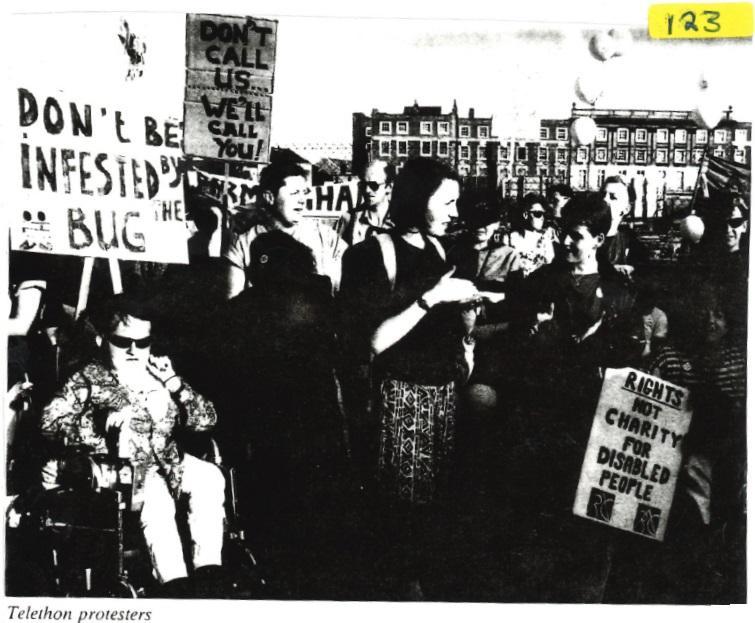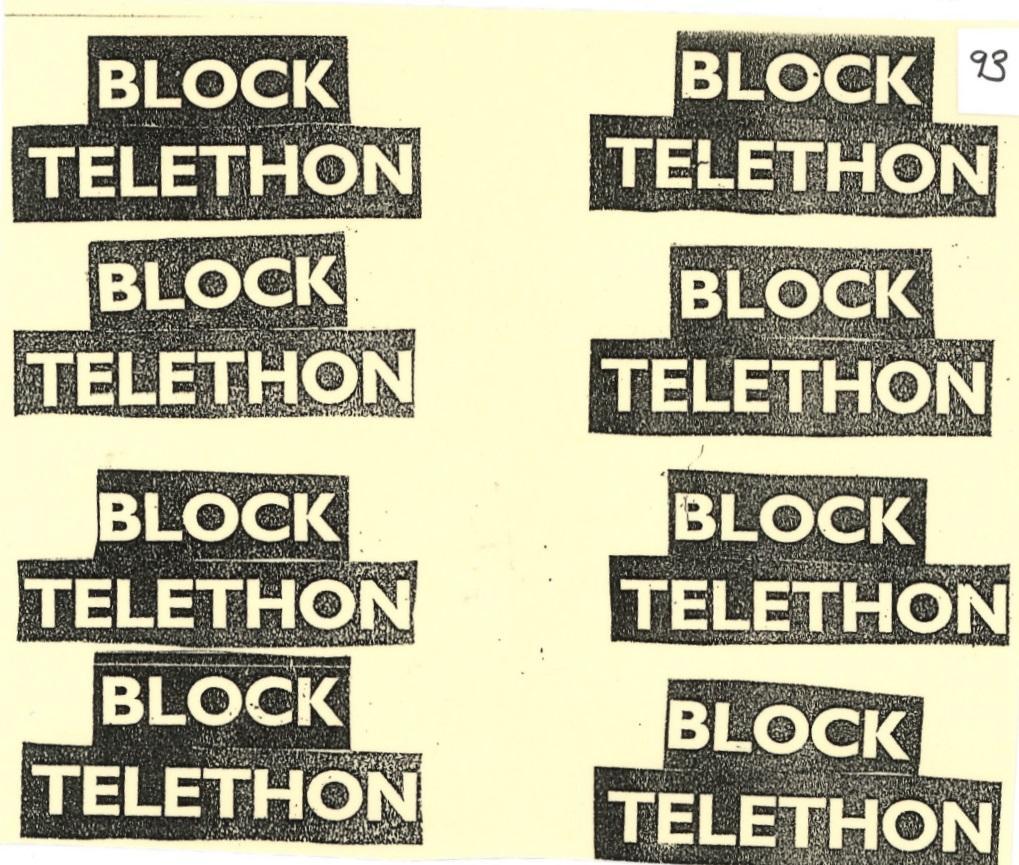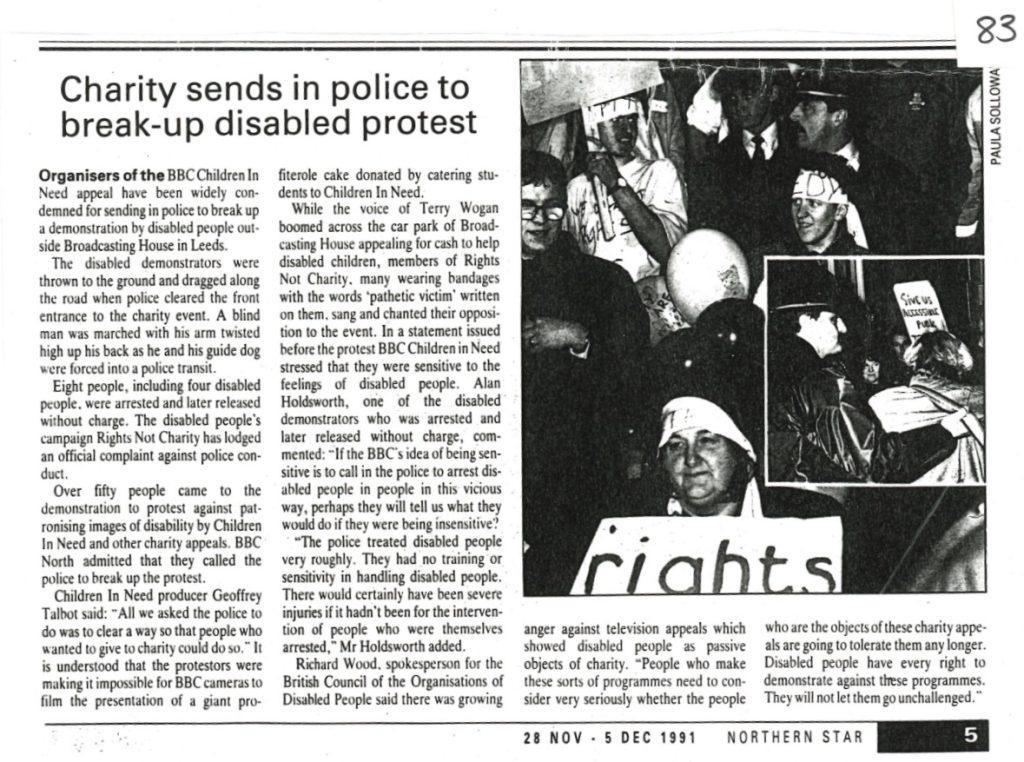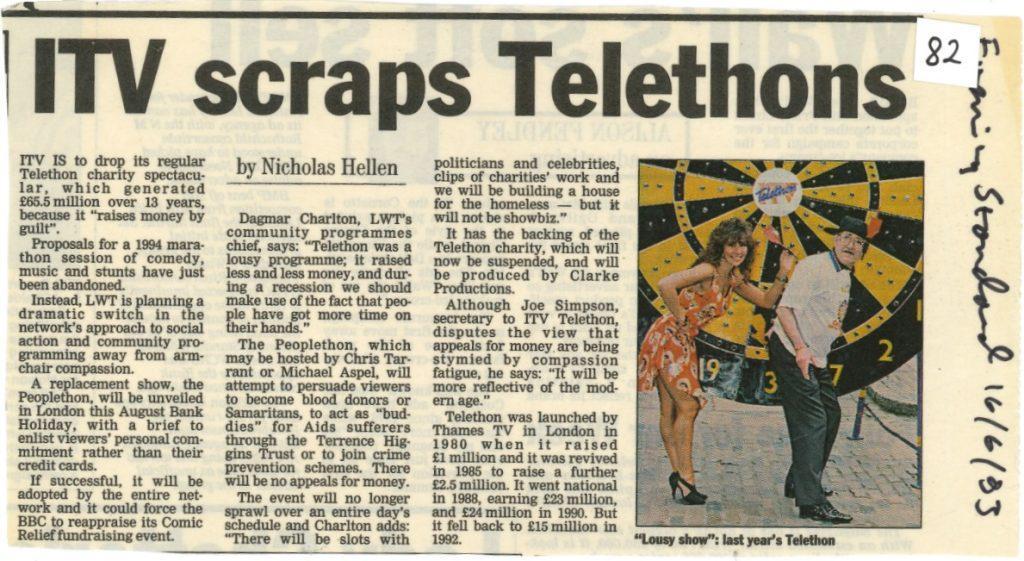Block Telethon: A Summary by Kirstie Stage
The Block Telethon protests of 1990 and 1992 marked two pivotal points in British disability activism. Led by disabled people, including groups such as Rights Not Charity, Block Telethon was a campaign against the charity fundraiser Telethon. The television programme, which was initially launched by Thames Television in London, sought to raise millions of pounds for major disability charities in the United Kingdom. At the same time, change was starting to take place with the renaming, rebranding and restructuring of organisations in the voluntary sector and the broadcasting industry. Both disability charities and media outlets alike were part of this trend, as demonstrated by Thames Television losing its franchise to the British ITV Network in 1992, thus playing a part in the ceasing of Telethon. This blog briefly explores the reasoning behind the Block Telethon protests, and its significance to disability activism in the United Kingdom.
Block Telethon originated from a long campaign against the use of disabled people in charity advertising. For example, prior to the demonstrations, the ‘Cap in Hand’ conference questioned how disabled people were depicted in charity advertising, television, and wider media. Block Telethon protesters opposed the ‘patronising images of disability’ put forward in Telethon’s fundraising initiative. This is illustrated in contemporary newspaper articles, with journalist Maev Kennedy noting that the protestors ‘accused the event [of 1990] of tokenism, patronage, and portraying a negative image of people with disabilities’.
Through multiple means, Block Telethon protesters challenged these narratives. Disabled people targeted ITV’s Telethon and began to develop ideas for posters, including ‘Piss on Pity’ and ‘Ask Us, Not Aspel’. Slogans like ‘Piss on Pity’ were described as “edgy”, “irreverent”, “challenging” and “moot”, rejected stereotypical tropes that had been typically associated with the reductive expectations and attitudes towards disabled people. In many ways, Block Telethon symbolised that disabled activists were not dependent on non-disabled people, a burden to society, or unable to advocate for themselves.
Archived texts and objects, deposited at the Disabled People’s Archive, show the vibrancy and dynamism of the Block Telethon protests. Multiple collections from the Disabled People’s Archive display the range of clothing, placards, music, performative action, art, and creative DIY-style protest materials. From printed t-shirts with written slogans such as ‘Disability Pride’ to instruction guides informing disabled protesters of their rights, Block Telethon highlights a snapshot of what was happening in the early 1990s. It was at this point that the Disability Arts Movement (as we know it today) was beginning to emerge and play an important part in the political activism of disabled people in Britain.
Drawing on protest songs, artwork, and performance, Block Telethon captured a moment of explosion of both the Disability Arts Movement and the Disabled People’s Movement, growing from its inception since the late 1960s and early 1970s in Britain. Block Telethon was not only a demonstration against a major television company’s fundraising programme, but an opportunity for disabled musicians and comedy acts to perform, creating a festival-like event of protest and celebration. Original sources from the Disabled People’s Archive show vivid accounts of acts and performance at a Block Telethon concert, including Johnny Crescendo, Barbara Lisicki, and Ian Stanton, with some using a public address system and professional staging.
Overall, Block Telethon represents a powerful message that holds true for our past and present: disabled people are individuals that should not be pitied. Block Telethon demonstrated the agency, creativity, and originality of disability activists. Events during the Block Telethon protests undermined the longstanding assumptions that disabled people were unable to campaign themselves and represent their views independently. Ultimately, Block Telethon put the ‘Nothing About Us Without Us’ slogan into practice, and exemplified that disabled people have an invaluable voice within politics. There is one unifying message from Block Telethon which remains important today: disabled people deserve rights not pity.
Further reading:
National Disability Arts Collection & Archive, ‘On the Block Telethon Protest’
Barbara Lisicki, ‘Block Telethon 1992 – the day we ‘pissed on pity’’
UK Disability History Month, ‘Disability: Leadership, Resistance and Culture’ [PDF]
Lisa O’Kelly, ‘Media: Another Telethon? What help is that if you’re disabled?: ITV’s fundraising marathon does more harm than good, says critics. Lisa O’Kelly reports’ [original news report from The Independent, 7th July 1992]
Text of the two newspaper clippings in images in this post [doc]





